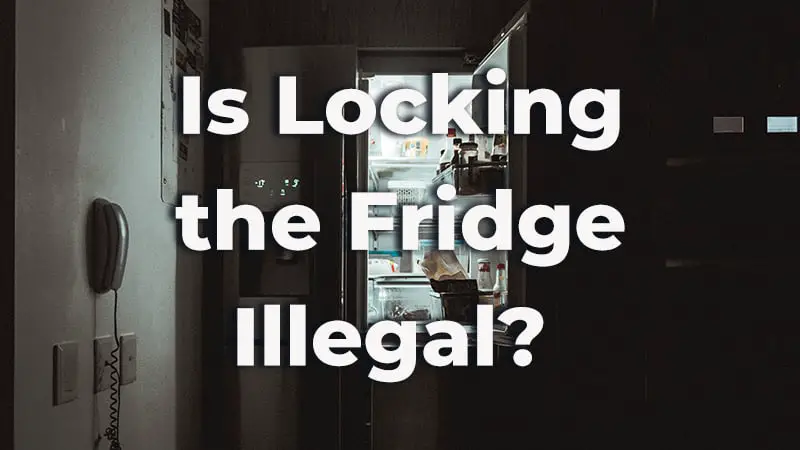There could be many reasons you want to put a lock on your refrigerator. Whether you have kids or live with your parents who suffer from cognitive impairment, locking the fridge may seem a reasonable idea.
However, locking the refrigerator is often not the best solution to resolve the problem. In certain cases, there are many other ways to control someone’s access to food.
And even if you choose to lock your fridge, there are many methods out there and not all of them are equally effective (hint: later on I’ll show you some of the most powerful ones).
As a side note, I want you to know that I’m not an attorney but someone who is probably in the same boat as you. Therefore don’t take my words as legal advice but as thought-provoking information from a critically thinking person.
Cases When It Is a Reasonable Solution to Lock Your Fridge
Usually (but not always), you want to lock the refrigerator if your kids or someone who you live with has some kind of health issue (for instance they must strictly follow a certain kind of diet), and unrestricted access to the fridge would lead to health damage.
Let’s see some examples:
- If your child suffers from phenylketonuria (PKU), they must always stick to their diet to prevent brain damage from developing. Assuming that you don’t have this disease, you probably keep food in the fridge that is potentially harmful to your kid.
If your kid is so small that they can’t completely understand the situation, it’s absolutely reasonable and normal to restrict their access to the refrigerator. In this case, in the vast majority of countries, it’s legal to put a lock on the fridge.
- Another situation when locking the fridge would be rational and considered legal is when someone lives with a demented person who must be on a diet.
For instance, if your mother suffers from severe cognitive decline (confirmed and diagnosed by a psychiatrist) and at the same time she has type I diabetes, it’s vital to prevent her from consuming too many carbs.
Not to mention that without restriction she might also have access to her insulin that you store in the fridge.
If she is unable to understand the significance of the proper diet, locking the fridge could be the (final) solution. However, in this case, I wouldn’t recommend that you start by putting a lock on the refrigerator and if you do so, always try to explain the situation to your elderly loved one.
A common issue is that people with severe cognitive impairment may forget to (completely) close the fridge door and that can significantly increase the energy consumption of the refrigerator and lead to a failure of the device.
Another reason to use a refrigerator door lock is to stop someone you live with from raiding your own fridge. So for instance, if you have your own refrigerator in your room and your roommate keeps stealing your snacks, it’s completely legal to use a lock to stop him or her from eating your own food.
Also, if you have your own fridge at your workplace, you can secure it to prevent your colleagues or strangers from having access to it. After all, locking your own stuff is not against the law.
In other situations, such as preventing binge eating or getting your child on a healthy diet, I would argue against putting locks on your fridge. At least, that wouldn’t be one of my first steps (I’ll show you some alternatives in a later section).
Make sure you also check out our article about kitchen safety for seniors.
What Type of Refrigerator Lock Should You Use? Is Any of Them Illegal?
There are a number of refrigerator door locks out there and as far as I know, none of them are illegal to use in most countries.
In case you have a small child you can use an adjustable peel and stick safety lock. These are usually made of plastic and both keyed and non-keyed models are available on the market. In the latter case, you just have to squeeze onto the bottom and top buttons to open the fridge. It’s a perfect way to baby-proof the fridge. You can also use it to lock your freezer.
If you are more of a visual type of person, check out this video to see how it works:

For greater security, you can use a heavy-duty refrigerator door lock with a padlock. It’s pretty strong and much more durable than plastic locks and works on side-by-side refrigerators too. It’s a great choice to prevent the fridge from being opened by an adult.
Possible Consequences of Putting a Lock On the Fridge
You should keep in mind that if you put a lock on the fridge in your home and restrict your mom’s, kid’s, etc. access, it could have a number of unpleasant consequences. Thus, I suggest that you only do this, if it’s absolutely necessary.
Let’s see some of these consequences:
- Your loved one you want to protect by locking the fridge can’t understand the situation and becomes frustrated and irritated. This is a greater concern in the case of people who suffer from dementia. As a consequence, they can start wandering inside or outside the house (if they can leave it) or decide to visit the supermarket.
- Older kids and demented persons might damage the fridge while trying to bypass the lock. It’s something they usually don’t do intentionally and often explaining the situation can help.
- Locking the fridge can have another negative consequence: your loved one might lose trust in you (it’s mainly a concern in the case of older children and adults). You want to protect them but if you fail to explain the situation and provide emotional support, your loved ones might become confused.
Always try your best to get your loved one to understand why you do what you do. Remember: restricting access to food just because you think a person without any mental disorder follows an unhealthy diet is rude and disrespectful. Check out the next section for some alternative measures that sometimes can work much better than locking the refrigerator.
Legal Solutions Other Than Locking Your Fridge
As you can see, you are better off thinking twice before locking the refrigerator as it could lead to all kinds of problems. If following a strict diet is not vital, check out and try the following viable alternatives:
- Do not keep unhealthy food in the fridge. If your goal is to improve your loved one’s health, the easiest way to do so is to keep only healthy food and snacks in the fridge. Get rid of sweets and desserts full of sugar.
- Educate your child. If your child doesn’t have to be on a strict diet, educating him or her is your best bet. If you do it right, there’s no need for locking the fridge. Teach your kid the basics of healthy eating and set an example: the sooner you start the better.
- Lock the room, not the fridge. If you still want to restrict access, you may want to consider placing the refrigerator in a separate room and locking the room instead of the fridge. This way there will be less temptation as the fridge will be out of sight.
- Have two fridges. Another solution is to have two fridges: one for the person who has to be on a diet and the other one for the rest of the family. This way you only have to lock one fridge and the other one can remain open. This means much less frustration and irritation as the person will have access to food whenever he or she becomes hungry. As a side note, I’ve created a visual guide on how to choose the right size refrigerator that can be a helpful resource to avoid extra costs if you decide to buy a new (or used) fridge.
Summary
While it’s true that putting a lock on the fridge is a simple and quick solution (and it’s not illegal), in most cases, it may not be the best one. Overall, I suggest that you only lock the fridge if it’s really important and vital or if you have your own refrigerator and want to prevent raiding.
In any other case, try to keep healthy foods in the fridge and educate the person you want to live a healthier life. Imposing your will on other people often leads to conflicts, and when it comes to your loved ones, that is the last thing you want.











